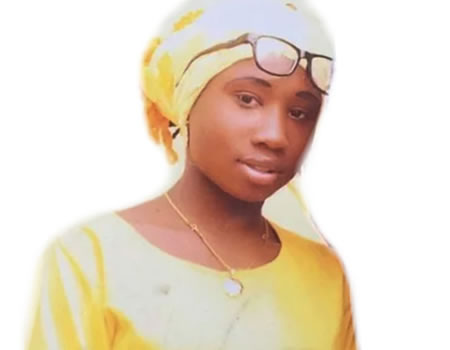Celebrating someone as a Person Of The Year is an achievement to reckon with. When that person is a teenage girl from a section of country where the girl child and women are regarded as second-class citizens, it calls for a monumental celebration.
Buhari cannot unilaterally suspend Onnoghen ― Ubani
This is the case of a fifteen-year-old Leah Sharibu who was abducted from Government Girls Science and Technical College, Dapchi, Yobe State, with other 110 girls on February 19, 2018 by Boko Haram insurgents.
Fortunately, on May 21, 2018, some of the abducted girls were released with five reported deaths. Unfortunately, Leah, the only Christian among them, is still in captivity because she refused to convert to Islam. This act of faith did not only attract the attention of the world, it also reinforced the essence of common humanity.
In recognition of this exemplary feat, two Nigerian newspapers, The Nation on December 23, 2018 and The Guardian, on January 1, 2019, recognised Leah Sharibu as their Person Of The Year 2018.
On the front page of The Nation’s aforementioned dated paper was Leah’s photograph with the inspiring quote, “For demonstrating the ultimate moral of resistance against religion as a weapon of evil, this shero is our Person Of The Year.”
Also, on the front page of The Guardian’s aforementioned dated paper was Editor-in-Chief Debo Adesina’s article titled ‘A goddess of resistance’ with Leah’s photograph on it. “She is a true heroine. And for being the goddess of a nation’s resistance to terror, she is The Guardian’s Person Of The Year 2018,” Adesina wrote.
Since her abduction and captivity, the media—both local and international—have been flooded with all kinds of comments. In the United Kingdom, some protestors were seen carrying placards with Leah’s photographs on them. Some of the placards read: “HELD BECAUSE OF HER FAITH FREE LEAH”. Others read: “EVERY GIRL SAFE IN SCHOOL”.
In Nigeria, some national figures have lent their voices to this matter. They include, but not limited to, President Muhammadu Buhari, Vice President Yemi Osinbajo, Nobel Laureate Wole Soyinka, Aisha Wakil (Mama Boko Haram), Ene Obi, notable clergies and imams, and some of Leah’s family and community members.
According to recent interviews published in The Nation, Donald Sharibu, Leah’s younger brother, said Leah’s dream was to be a medical doctor with the intention of helping humanity. “I want to see her come back alive so that we can play again,” he said, adding in tears, that he cannot imagine Christmas without her.
Leah’s father, Nathan Sharibu, said they wake up every day expecting to hear good news. “The God that she did not denounce will do something for her miraculously, the way Daniel was rescued from the lion’s den,” he said.
Leah’s mother, Rebecca Sharibu, said they were proud that Leah did not renounce her faith. “She did the right thing in the sight of God,” she said.
Secretary of the Association of Dapchi Abducted School Girls’ Parents (ADASGP), Bukar Kachalla, spoke the minds of the community when he said, “We are still faced with the problem of Leah Sharibu still held by Boko Haram.”
Leah’s pastor at Evangelical Church Winning All (ECWA), Reverend Daniel Auta, put it this way, “He that is in Leah is greater than he that is in the world.”
In a country like Nigeria with over 180 million people who claim one religion or the other, there is no doubt that Leah’s unflinching resolve in her faith has some significance and implications both on individuals and the nation.
On individual level, it signifies that religion is a personal pursuit that requires self-awareness and determination. It proves that places of religious worship are not the best places to showcase one’s righteousness or flaunt one’s faith, but rather in the camps of evildoers.
There is a saying that: “The hottest place in hell is reserved for those who maintain their neutrality in times of moral crises.” Leah did not keep mum in the face of terrorism. Her roaring voice against the oppressor of humanity still echoes in the minds of many Nigerians.
At the national level, the implications of Leah’s martyrdom cannot be overemphasised. Since the inception of Boko Haram terror and its colonisation of the Northeast, billions of naira has been earmarked and expended in the fight against insurgency, but to no avail. The Nigerian military, even with the help of some international intelligent communities, has not been able to defeat Boko Haram.
However, Leah, a one-girl army, did the job. She looked Boko Haram straight in the eyes and literarily said: I am not afraid of you; do your worst. She did not only change the religious narrative of Nigeria, she also caused a paradigm shift on how the two major religions in the country perceive their waning security, their common hope.
Leah, with this feat, has established herself as an advocate system for women’s right, safety in schools and religious tolerance. She is, no doubt, the personification of religious freedom. She lives what she believes in, contrary to many so-called religious people who shout what they claim to believe in. Leah has proven the veracity of the maxim: Action speaks louder than words.
Leah’s refusal to renounce her faith for another is a conviction that she knows her root and identity. Unfortunately, the root of Nigeria seems to have been eroded and her identity traded for obscurity. Leah’s life is a reminder of both individual and national introspection, reconciliation and reunion geared towards a better Nigeria devoid of terrorism and religious fanaticism.
At this juncture, it is imperative to state that while national honours are lavished on selfish politicians who would rather embezzle the security votes and other monies meant to protect the citizenry, Leah rightly deserves such honours. Without mincing words, she has obviously earned it.
Unfortunately, it is disappointing that the circumstances surrounding the abduction and possible release of Leah have been politicised. It is sickening that it has now become the subject of political campaigns and elections. The glaring triviality with which the government has handled such an international matter suggests that, not just the life of Leah, but also those of ordinary Nigerians, does not matter.
On the contrary, The Guardian set the record straight when it said, “By her principled stand, the battle for the soul of Nigeria has become one between a young girl with a heart and a garrison of devils with no souls.”
How the destiny of Nigeria lies on the shoulders of young Leah. Wole Soyinka emphasised this when, on June 5, 2018, he said this about Leah, “I saw in her the spirit of Kudirat Abiola. When she said No, she spoke for all of us.”
Leah has, with this unprecedented feat, demonstrated that the fight against terrorism could be won with faith. Though nobody knows if she is alive or not, everybody knows she is fearless and strong, even in the face of terror. Boko Haram might have won the physical battle, but the moral victory definitely belongs to Leah.
Prior to her abduction, Leah Sharibu was just an ordinary Dapchi school girl studying to become a medical doctor. But today, her faith has immortalised her as an international heroine. Indeed, she deserved The Nation and The Guardian Person Of The Year 2018.
Kingsley Alumona is with the Nigerian Tribune






